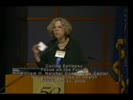Special CCR Grand Rounds
2024 AAAS Martin and Rose Wachtel Cancer Research Award and Lecture
“Understanding Plasticity as a Mechanism of Resistance to Therapy in Cancer”
Alvaro Quintanal-Villalonga, Ph.D.
Assistant Attending Biologist, Department of Medicine
Research Lab Co-Director, Sloan Kettering Institute
Memorial Sloan Kettering Cancer Center
Registration is required for this event.
To register for the lecture, please visit https://go.cancer.gov/4YOcK4b
The Wachtel Cancer Research Award is presented to early-career scientists who have made outstanding contributions to the field of cancer research. This is the tenth lecture for the award, sponsored by the American Association for the Advancement of Science (AAAS) and Science Translational Medicine. The National Cancer Institute (NCI) Center for Cancer Research (CCR) is co-hosting the event.
Dr. Alvaro Quintanal-Villalonga is a lung cancer researcher with basic and translational research experience in the field of molecular oncology and targeted therapies, with a special focus on small cell lung carcinomas (SCLC) and lineage plasticity-driven resistance to targeted therapy through histological transdifferentiation.
During his Ph.D. at the Spanish National Cancer Research Center (CNIO) under the mentorship of Dr. Luis Paz-Ares, Dr. Quintanal-Villalonga studied the role of the tyrosine kinase receptors (RTKs) fibroblast growth factor receptors (FGFR) in lung cancer. His research works demonstrated that the pro-oncogenic effects of FGFRs are molecular context dependent, as these receptors require a binding partner for activation (N-cadherin) and co-operate with other RTKs such as EGFR resulting in EGFR-targeted therapy resistance. This work identified predictive biomarkers of response to FGFR inhibitors in monotherapy and in combination with EGFR inhibitors, leading to the initiation of two phase I/II clinical trials.
After obtaining his Ph.D., Dr. Quintanal-Villalonga was recruited by Memorial Sloan Kettering (MSK) Cancer Center as a postdoctoral researcher to join the laboratory of Dr. Charles Rudin. There, Dr. Quintanal-Villalonga investigated the molecular mechanisms driving lineage plasticity and ultimately histological transdifferentiation (adenocarcinoma to small cell or squamous cell carcinoma) in lung tumors, which are responsible for the acquisition of resistance to targeted therapies in a subset of lung adenocarcinomas with particularly poor prognosis. These works led to the identification of biological and signaling pathways potentially driving histological transdifferentiation, and to the identification of therapeutic targets whose inhibition was able to delay or prevent it. Additionally, Dr. Quintanal-Villalonga focused on the study of the molecular biology of SCLC tumors and on the identification of therapeutic targets for these aggressive malignancies, for which only sparse treatment options showing limited efficacy are available. This work led to the generation of a single-cell resolution atlas of SCLC clinical specimens describing a novel mechanism for metastasis in this tumor setting and to the identification of therapeutic targets potently sensitizing SCLC tumors to chemotherapy.
In 2022, Dr. Quintanal-Villalonga was promoted to a faculty position at MSK and set the focus of his research on lung cancer therapeutics, including the identification of therapeutic approaches for different lung cancer subtypes, and on the further study of molecular drivers of lineage plasticity and histological transformation, with a particular interest in those amenable for therapeutic intervention.
|









